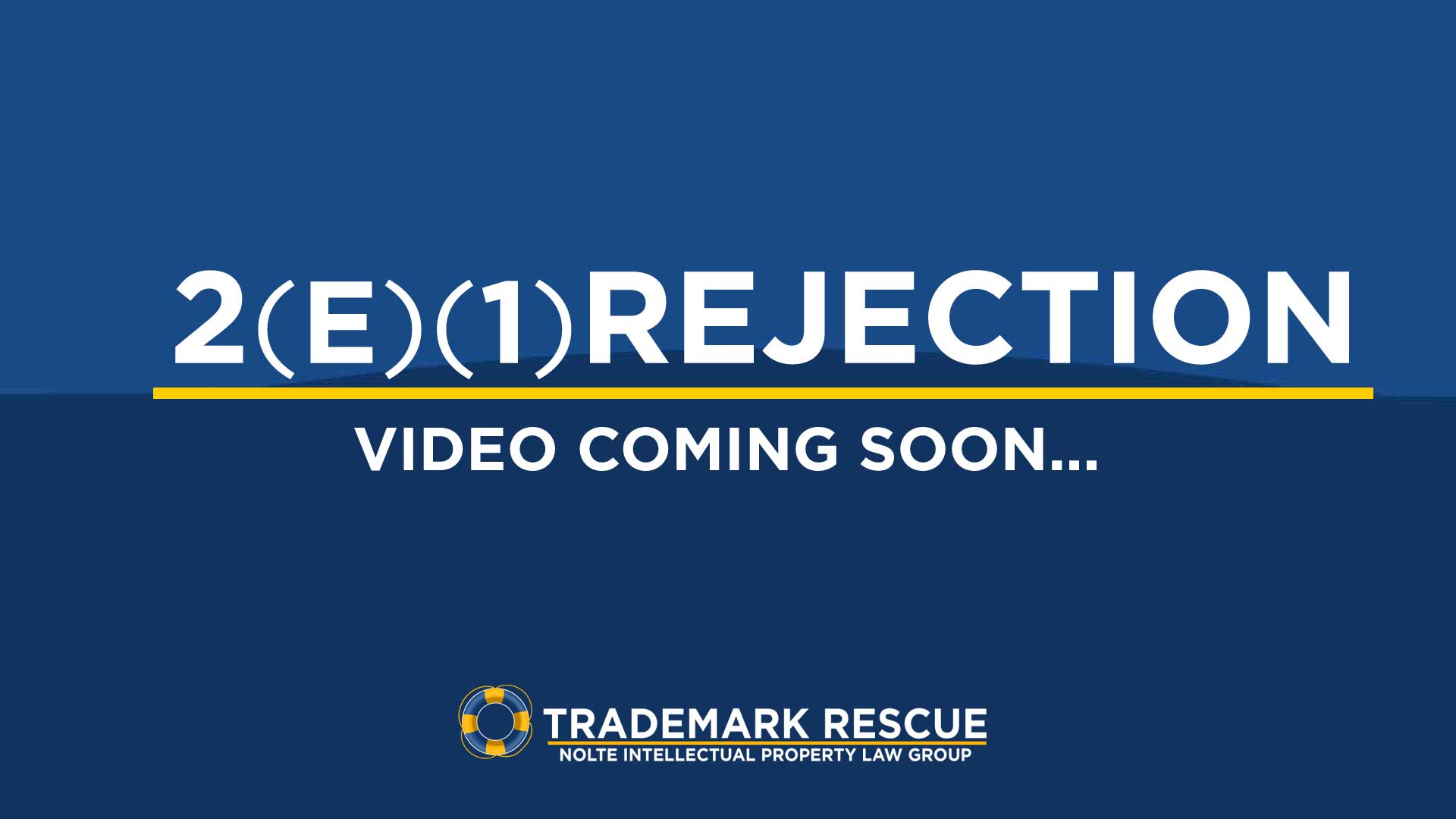Don't Let Your Hopes for Registering Your Trademark Just Float Away...
Can intellectual property be important for your small business?
Welcome to Small Business IP Guidance.
Understanding intellectual property is not rocket science.
But the legal
aspects are sometimes counter intuitive or sometimes downright obtuse.

Welcome!
You’ve landed in this virtual port of call because you received a notice from the USPTO and your trademark application appears to be sinking! While we can’t guarantee that it can be saved, what we can guarantee is that if you give us a chance to look at it we will give you our honest opinion on whether we think it can be rescued, and a clear plan and costs for what it would take for us to do that for you.
The people behind Trademark Rescue are experienced intellectual property attorneys that also happen to be seasoned entrepreneurs and educators. We also love technology, processes, and internet marketing, so we have undertaken to combine all of these things to offer what we think is a more efficient, transparent, and cost-effective way to provide high quality trademark services and information to entrepreneurs and small business owners.
TMRescue.com is a service of Nolte IP for Small Business.
WHY ARE WE DIFFERENT
It's What We Do
We are all about trademarks! We've been doing it for decades and want to share our experience with YOU!
WE WORK WITH THE BEST
Our services are all handled by professionals in the field, and when you need legal help, experienced and accomplished trademark attorneys go to work for you!
GET TO KNOW US!
GET TO KNOW US! We love talking trademarks, so reach out and see if we can help!
Our Expertise
We get it, and we are here for you.
You are an entrepreneur/small business owner and you are used to doing EVERYTHING yourself. We applaud your spirit and we know that the hopes and dreams you have for your product or service and your business are important to you. Filing for a trademark was one of the million things on your to do list, and the online form or the "filing service" seemed simple enough to use. Then you received some correspondence from the Trademark Office and things became more complicated then you had anticipated.
Don’t just give up now, though! Let us see if we can help rescue your trademark and put it back on track.

TRADEMARK OFFICE ACTIONS 101
Introduction
It is likely that you are visiting this page because you have filed an application for Federal Trademark Protection, but after a few months you received an IMPORTANT NOTICE REGARDING YOUR U.S. TRADEMARK APPLICATION from the United States Patent and Trademark Office (USPTO). This is what is commonly referred to as an “Office Action.” This kind of notice can be intimidating, but Office Actions are quite common. This article will give you some information about what you can do to try to succeed in registering your mark.
First Thing - RELAX!
Just because your application has been "refused," this doesn't necessarily mean that it can not ultimately be registered. As stated above, office actions are quite common and some can be answered in a straight forward manner. Below you will find some information so you can familiarize yourself with an office action to help you respond, or be better informed as to your needs when seeking an attorney to help.
Read the Office Action From the USPTO Carefully
The purpose of an office action is to clearly state the reasons why the USPTO has denied registration of your mark, and there may be multiple issues which you are required to address in order for you to overcome the Examiner's refusal. Some of these issues are more straightforward than others, with problems ranging from simply needing to change the way you have described your goods or services, all the way up to requiring a full, legal argument in order to overcome the Examiners' opinion that your mark would result in a “likelihood of confusion” with another registered mark.
Make Sure You Respond Fully to All Reasons for Denial
There is also another reason to make sure you’ve carefully reviewed the entire office action - you must respond to ALL of the reasons raised for refusing registration of your mark when submitting your response. This is very important! If you do not respond to the office action completely, your mark will not be approved and you will receive another, possibly FINAL, office action. If you do receive a Final office action, it is your last chance to fix any defect in the application, or present arguments in favor of registration before you would need to "request reconsideration" and appeal the refusal to the Trademark Trial and Appeal Board. And if you do not respond to an office action at all, then your application will be deemed abandoned, and you will lose any priority filing rights in your trademark that you may have had, as well as forfeit your application filing fees.
Common Types of Denials
Office actions are issued for a variety of reasons. Some are administrative in nature, while others are substantive. Below is a list and short description of some of the common types of denials for registration given by the USPTO.
Descriptiveness
A refusal for "descriptiveness" means that the USPTO feels that your trademark “merely describes” what your product or service does or is about. An example would be trying to register the mark “Super Sharp” as the name of the kitchen knives you are selling. If a descriptiveness refusal is issued, there are three possible ways to overcome it. First would be demonstrating that your mark is not "merely descriptive," but it is "suggestive" of the goods or services that you are providing. The line between a "descriptive" mark and a "suggestive" one is key. A second option is to show that your mark has “acquired distinctiveness” or gained “secondary meaning” in the marketplace. In other words, it would have to be demonstrated to the Examining Attorney that your trademark is better understood to indicate you as the source of the goods or services than the common meaning of the term. In the above example, this means that when consumers hear “super sharp” they would need to associate that with the BRAND of knives that come from YOU, more so than just thinking that super sharp knives are good to have for practical reasons. It generally takes being able to demonstrate 5 years of use of a mark, or significant amounts of money spent in advertising and marketing if it has been less than 5 years, to be able to claim “acquired distinctiveness." If you don’t have this long-term usage or promotional expenditures to overcome this type of rejection, there is still something you can possibly do, which is moving the filing to the Supplemental Register. Be aware, however, that only marks that are actually being used in commerce can be amended to the Supplemental Register.
Likelihood of Confusion
This is the most concerning reason for a refusal. When reviewing an office action with this reason for rejection we HIGHLY recommend retaining an attorney. This rejection means that the Examining Attorney has found your mark may be confused by consumers with a mark that is already registered. This also could have implications related to whether your mark would be considered infringing on the rights of someone else. To overcome this type of rejection, a well organized and complete argument as to what makes your mark different from the mark or marks that the Examiner has cited must be presented. This can include differences in the goods or services you offer, the channels of trade that the products or services travel in, the sophistication of the consumers you are targeting, and a list of other factors. Again, this is a good point for you to consider retaining legal counsel.
Specimen Refusal
Sometimes the USPTO finds that the “specimen” or “evidence” showing use of your mark that was submitted with your application doesn’t meet their requirements. There are several types of trademark application filings, with one of the most common being a filing based on “actual use” of your mark in commerce. In these types of filings you are required to submit a specimen or evidence showing that the mark you want to register is being used in connection with the product or service you stated in your application. Filing the correct specimen is crucial to successfully registering your mark, as the USPTO will not issue a registration certificate until you have satisfactorily shown that you are using the mark in a way that constitutes actual trademark usage. This can sometimes be a tricky and confusing endeavor, so if you are not sure about what a correct specimen looks like or "actual trademark usage" would be, you should consult an attorney.
Identification of Goods or Services
It is important to keep in mind that trademark rights do not grant you protection against uses of the mark you are trying to register by all other businesses. When you file your mark, you are required to describe the goods and/or services which you offer. It is important to get this description correct, and in a manner that reasonably (and actually) covers all of the items or services you provide or will be providing. Writing this description with indefinite language can trigger a rejection from the USPTO. Simply put, the government will allow you to register your mark for the business you are in, but it also wants to make sure that it still preserves rights for others in businesses that you are not in. There is a balance here, and an experienced attorney can help guide you to the best description.
Conclusion and Getting Help
Don’t let the letter from the USPTO with their ALL CAPS language scare or deter you. Office Actions are common, and commonly overcome. Understanding the process and the reasons behind the issues can go a long way to reducing the anxiety created by the unknown and the fear of losing your trademark. Some administrative rejections can be quite simple and easy to fix. An experienced attorney can review your office action, explain fully what the Office Action means for you, and even file your response.
*This article provides general educational information about our practice area and is not intended as legal advice, nor does it create an attorney-client relationship with you. If you are looking for assistance specific to your situation, you must contact an attorney.
ATTORNEY ADVERTISING MATERIAL
Please note! This site is for advertising of legal services and informational purposes only and is not legal advice. Contacting us through this site does not create an attorney-client relationship between you and Nolte & Associates, P.C. You should not act upon the information on this site without first entering into a written agreement with the firm or seeking advice from a lawyer of your choosing. Please note that you should not send any confidential information pertaining to potential legal services to the firm until you have received a signed written agreement from the firm to perform the legal services you requested. Unless you have received such written confirmation, the firm will not consider any correspondence you send as confidential.







